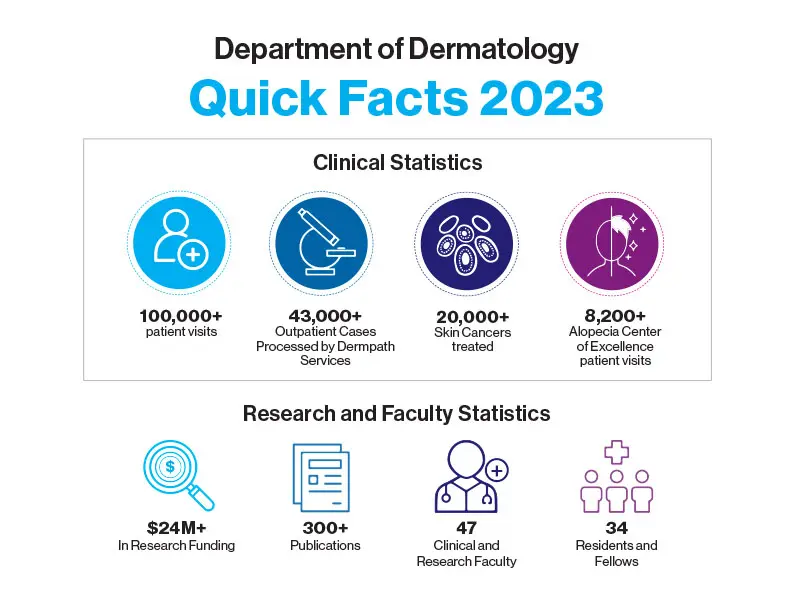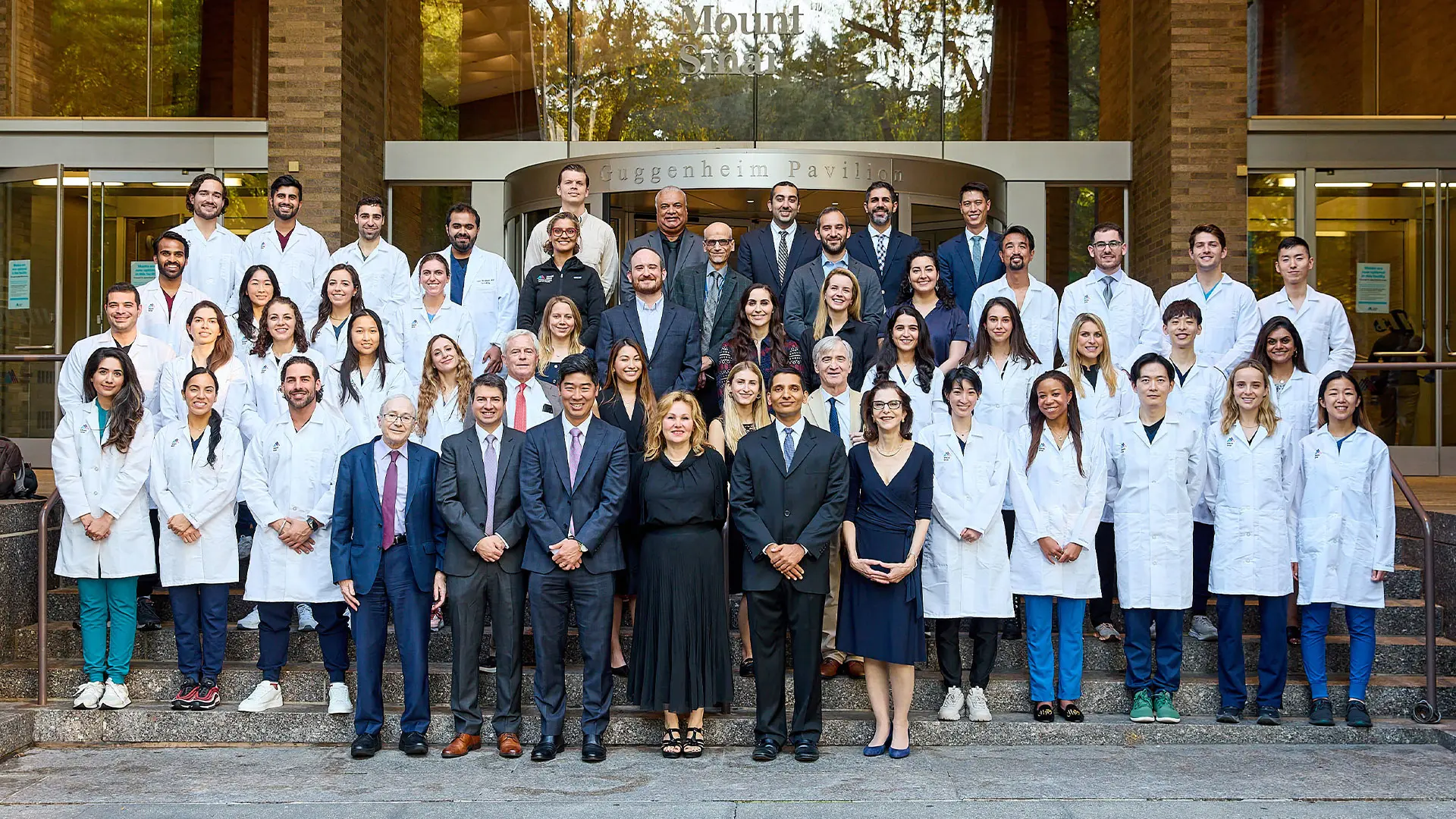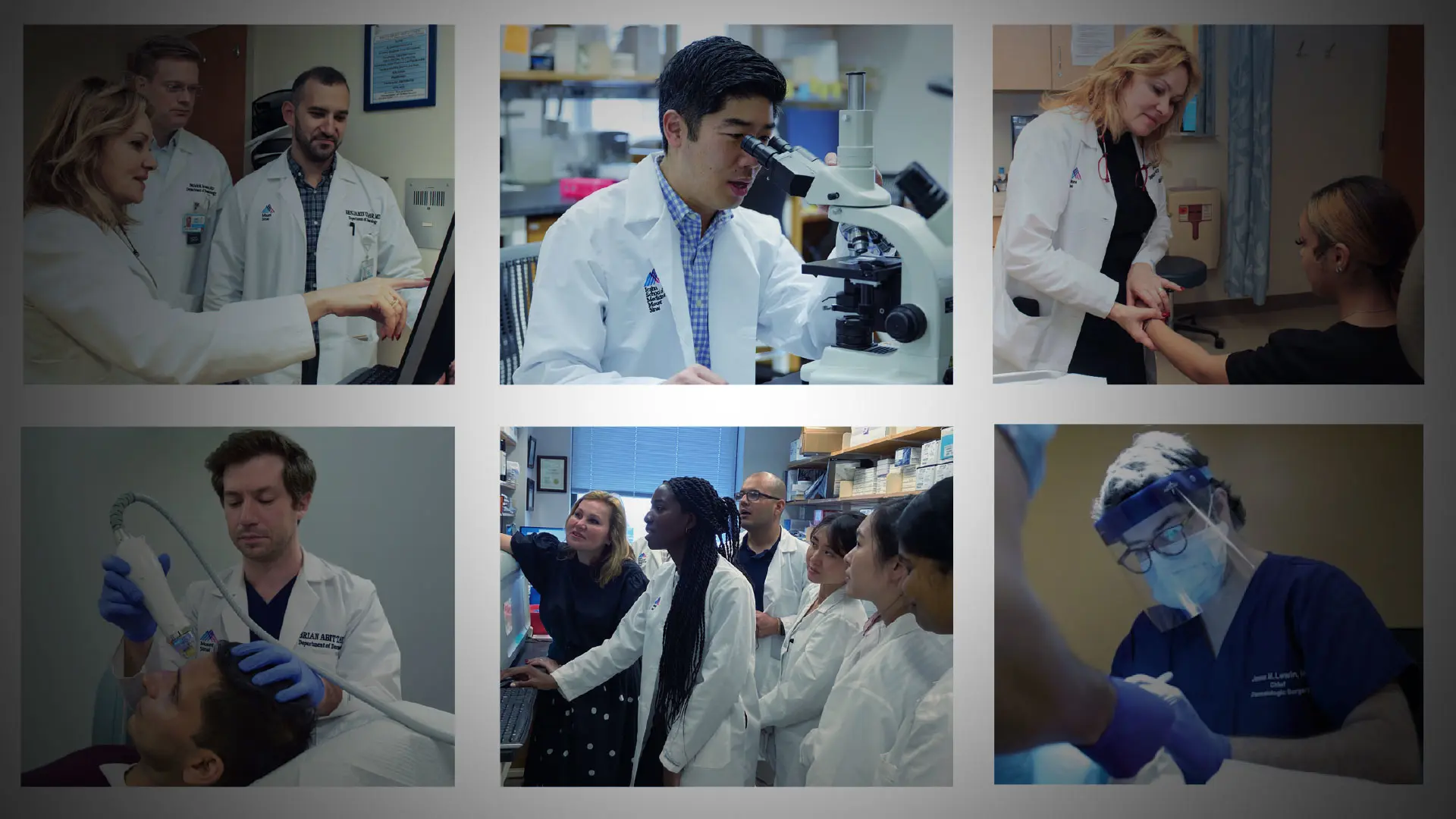
Emma Guttman-Yassky, MD, PhD, Waldman Professor and System Chair, The Kimberly and Eric J. Waldman Department of Dermatology; Director, Center of Excellence in Eczema;
Director, Laboratory of Inflammatory Skin Diseases Icahn School of Medicine at Mount Sinai
With more than 100,000 patient visits and more than $24 million in research funding, we conducted groundbreaking, translational research and expanded our clinical trials scope. We have also received large grants from foundations and pharmaceutical companies, a significant accomplishment that was supported by our new recruits and our current faculty, along with our newly expanded federal/foundation grants team.
Our endeavors continue to position the Department at the world’s epicenter of research in inflammatory diseases, including as eczema/atopic dermatitis, alopecia areata, scarring alopecia, psoriasis, vitiligo, hidradenitis suppurativa, and keloids, as well as many other skin diseases.

We recruited top faculty talent in 2023, many of whom do innovative science. They will help to expand our efforts in groundbreaking research and contribute to our upward trajectory as a U.S. and world leader. Our recruits include:
Jonas Adalsteinsson, MD, PhD, has joined as an Assistant Professor and Director of Autoimmune Blistering Diseases, and Director of Dermato-epidemiology. Dr. Adalsteinsson’s clinic will focus on autoimmune bullous diseases and skin cancers. Dr. Adalsteinsson sits on the Mohs use committee of the American Academy of Dermatology, and his research focus has been on skin cancers and associated risk factors.
Courtney Ensslin, MD, is a double board certified dermatologist and Mohs micrographic surgeon and an Assistant Professor within the Division of Dermatologic and Cosmetic Surgery. Dr. Ensslin’s research is focused on the integration of technology and innovation in dermatologic surgery to improve patient outcomes.
Justine Fenner, MD, completed a pediatric dermatology fellowship at Columbia University before we recruited her back to Mount Sinai where she completed her residency in our program and served as Chief Resident. Dr. Fenner will direct a clinic that focuses on pediatric and adolescent dermatology.
Jordan Talia, MD, FAAD, joined as Assistant Professor, Director of the Skin of Color Center, and Director, Complex Medical Dermatology Clinic. He completed a fellowship in complex medical dermatology at the Brigham and Women’s Hospital, and Dana-Farber Cancer Institute. Dr. Talia has co-authored numerous articles in peer-reviewed medical journals and is a fellow of the American Academy of Dermatology.
Ahuva Cices, MD, is a recent graduate of our dermatology residency program where she served as Chief Resident. Dr. Cices joined as Assistant Professor, Dermatology, and Director, Clinic for Cutaneous Manifestations of Inflammatory Bowel Disease, and Director, Cosmetic Dermatology for Patients with Autoimmune Disease. By establishing specialty clinics in these areas, Dr. Cices will help to fill a void in patient care.
Hongzhen Hu, PhD, a leading, internationally recognized neuroscientist, joined as Scientific Director of the Mark Lebwohl Center for Neuroinflammation and Sensation, and Professor, Dermatology and Neuroscience. Bringing multiple NIH RO1 and other grants, Dr. Hu will work alongside Brian S. Kim, MD, MTR, FAAD, Vice Chair of Research and Director of the Mark Lebwohl Center, and partner with Paul Kenny, PhD, Chair of the Nash Family Department of Neuroscience, and Eric Nestler, MD, PhD, Director of the Friedman Brain Institute, to bring together multiple areas across Dermatology and Neuroscience. Dr. Hu has set up his lab at the new Discovery and Innovation Center in Midtown West and is helping to recruit many new investigators to Mount Sinai with the aim of building the world’s leading program in neuroimmunology.
Michel Enamorado, PhD, provides a holistic perspective in his investigative work, through his training in immunology, neurobiology, and host-microbiota interactions. Bringing major NIH funding, Dr. Enamorado will investigate how immune cells regulate peripheral nervous system regeneration, and what are consequences of this neuroimmune interaction for tissue physiology and repair. He has published more than 18 peer-reviewed research articles in highly regarded journals such as Cell, Journal for ImmunoTherapy of Cancer, Science, Nature Immunology, and Frontiers in Immunology.
The Kimberly and Eric J. Waldman Melanoma and Skin Cancer Center, under the leadership of Jonathan Ungar, MD, continues to offer a rare combination of technologies that allow the most advanced, cutting-edge services in monitoring, diagnosing, and preventing melanoma and other skin cancers. More than 1,000 biopsies were avoided in the past year due to the noninvasive technologies employed by the Waldman Center, and more than 20,000 skin cancers were treated. The Center uniquely offers the Vectra WB180® system with 3D Total Body Photography. One of only two systems in the New York region, it captures pictures of the entire skin surface at high resolution within seconds, then identifies, tags, and maps all the patient’s moles on at three-dimensional avatar. This innovative tool catches skin cancers at the earliest possible stage while avoiding unnecessary skin biopsies. The Center aims to continue to explore multiple advanced technologies and novel techniques to allow for early detection and cure of skin cancers.
Our Alopecia Center of Excellence (ACOE) is up and running, providing more than 8,200 patient visits a year. The Center was made possible by a $5 million commitment from our donors, the Pure family, together with several other families. It is the first-of-its-kind centralized center integrating compassionate patient care, translational and basic research, and transformative new treatments developed through clinical trials for alopecia. Benjamin Ungar, MD, as Director of the Center, strives to expand research and develop novel treatments. Noteworthy is an expected $3.9 million NIH/ NIAID (Emma Guttman as Lead PI) UO1 grant to study dupilumab in pediatric patients with alopecia areata, with funding being initiated in the first quarter of 2024. Research from the Center is identifying new molecules that may be pathogenically associated with alopecia areata, creating the rationale for their future targeting in clinical trials, to increase therapeutic options for patients with alopecia areata. We also are offering novel studies to patients with scarring alopecia, which may result in new treatments for these diseases that pose a large unmet need.
Under the direction of Brian S. Kim, MD, the Mark Lebwohl Center for Neuroinflammation and Sensation is gaining momentum with increased research funding from both federal and industry sources. Its establishment was made possible by $4.7 million of philanthropic dollars raised, and it continues to conduct groundbreaking research to understand the connections between skin immunity, inflammation, and neurosensation. The investment in the Lebwohl Center by our generous donors and Mount Sinai was quite visionary. That support foresaw the explosive growth in the new field of neuroimmunology, which has recently received validation from the Paul G. Allen Family Foundation granting Mount Sinai $10 million over four years for the Allen Discovery Center (ADC) for Neuroimmune Interactions at Icahn Mount Sinai. Its new location at the Discovery and Innovation Center in Midtown West places it at the epicenter of Mount Sinai’s new biotechnology hub. This is the first time that an Allen Family Foundation grant has been given to an institution in New York City, and we are happy to host the Center and this collaborative effort between several New York institutions (including Icahn Mount Sinai, Weill Cornell Medicine, NYU Langone Health, and Yale School of Medicine).
We are in the final stages of transitioning Dermatopathology into our Department with 10 percent growth in patient volume in 2023. Since 2019, we have added more than 30 percent of our total patient volume with increased turnover times and expansion of our client roster. Our Dermatopathology Services Lab will open at a new location in the fall of 2024. We are recruiting candidates with expertise in digital dermatopathology and applications of Artificial Intelligence (AI), with the goal to develop a dermatopathology database for the purposes of future research.
Our Mohs Micrographic Surgery unit is the only academic center in New York City and one of only a few globally to have implemented MART-1 staining for early melanoma, a unique same-day service, with approximately 1,100 Mohs cases completed in 2023 by Jesse M. Lewin, MD, FACMS. This number reflects a huge increase from only 450 cases a few years ago.
Our Department was awarded a highly coveted T32 grant for “Research Training in Systems Skin Biology” in 2023. Beyond federal support, this grant brings national prestige to our Department and Icahn Mount Sinai, creating an intersectional science training program for both predocs and postdocs, and we are initiating this year a 2+2 and/or 2+1 residency research track program.
The Department of Dermatology at Mount Sinai was ranked No. 1 in research output by Doximity’s Residency Navigator for the second year in a row. The highly coveted ranking is taken from the largest survey and CV analysis of current residents and recent alumni. Additionally, the number of residency applicants increased by 300 percent in 2023. Almost 100 applicants gave us a gold signal with many more giving a silver signal, attesting to the desirability of our program and its increased ranking.
We continue to partner with the Biologic Treatment Center at The Mount Sinai Hospital. Giving comprehensive education and support to our patients in need of biologics, the Center also provides a dedicated team advocating for better patient care and facilitating insurance approvals.
Our Dermatology Advisory Board continues to foster philanthropic growth with more than 25 members. The Board’s continued generous support and expertise will help us push the boundaries of research and dermatology clinical care, bringing better outcomes to our patients.
Thank you for reading about our journey, and we wish you all a prosperous and productive 2024!

Emma Guttman, MD, PhD, center, with faculty, residents, and fellows of the Kimberly and Eric J. Waldman Department of Dermatology
